| Your browser is not supported. | ||
|
Please browse our site using any of the following options:
| ||

Beginner Tips For Mountain Biking
As seasoned riders, we'll navigate you through the rugged terrain of tips and tricks, ensuring your ride is not only thrilling but safe and skillfully executed.

Treasure Hunting 101: Everything You Need To Start Prospecting
If you'd like to try a bit of prospecting, it's important to know some of the basics before you head off and invest in a heap of equipment.

Camper Trailer vs Tent vs Rooftop Tent - What's Best For Me?
Whether you’re a seasoned camping enthusiast or like to pitch the tent now and again, choosing the right shelter can greatly enhance your outdoor experience.

Make The Most Of The Wet Weather With These 7 Rainy Day Activities
Has the rain dampened your upcoming outdoor adventure? Don't let the drizzle dampen your spirits - embrace it with our 7 rainy day activities to make the most of the wet weather.

10 Outdoorsy Date Ideas For Couples
From the most adventurous date ideas, all the way to the most fun outdoor date ideas, here are our top picks (from the love experts at Anaconda) for the top 10 outdoorsy date ideas for couples you absolutely need to try for your next date!

Everything You Need For Festival Camping
Get ready to transform your festival campsite into a home away from home, ensuring that you not only survive but thrive amidst the vibrant beats and communal vibes. Let the festival camping adventure begin!

Top 6 Bodyboards For Summer
In this blog, we unveil our handpicked selection of the 6 best bodyboards for summer, considering factors like buoyancy, durability and design. Gear up, hit the surf and let the summer vibes carry you to aquatic bliss!

Where To Find The Best Spots For Snorkelling In Victoria
Dive into this blog as we guide you through the azure beauty of Phillip Island, the secluded charms of St Leonards Pier, and the kaleidoscopic marine tapestry of the Mornington Peninsula.

Kids' Summer Essentials
There's a lot to consider when it comes to the kids getting out and about in the summer - and staying safe while they're at it. You'll want to make sure they are protected from the sun but, at the same time, you want them to have as much fun as…

Best Travel Sandals For Different Outdoor Terrains
Embarking on an outdoor adventure means choosing the right footwear, and when it comes to outdoor footwear, sandals take centre stage. However, not all sandals are created equal, and navigating different types of diverse terrains demands the right type…

Where To Find The Best Spots For Snorkelling In Sydney
Whether you're a seasoned snorkeler or a first-timer, join us as we explore the captivating world beneath the surface and discover why snorkelling in Sydney is a must for nature enthusiasts and water lovers alike.

Packing Tips For The Holiday Season
As the holiday season approaches, the excitement of festive gatherings and travel plans begins to fill the air. Amidst the joy, the art of efficient packing becomes a crucial skill, especially when trying to cram all of your gear into one or two…

Safety Tips For Pool Toys & Inflatables
As the sun-soaked days of summer approach, the allure of poolside fun becomes irresistible. Whether you're planning a leisurely swim, a lively pool party or a family water adventure, pool toys and inflatables often take centre stage. While these...

How To Start Trail Running
Trail running provides the ideal opportunities to explore new places and conquer physical challenges, making it more than just a workout. If you are looking for a new and exciting way to work out, then trail running is for you.

What To Wear Paddle Boarding
Our expert SUP team at Anaconda has created this helpful guide that will detail exactly what to wear paddle boarding through the year plus all the essentials you’ll need.

Five Summer Essentials For Hitting The Beach
Whether it is keeping your drinks and food cold during the day, providing shade from the harsh Aussie sun, making sure you always have a comfy place to sit or more, here are our top picks for the five beach essentials…

Beach Umbrella Vs Beach Tent - Which One Is Best For You?
If you’re struggling with this summertime conundrum then fear not, our team of beach tent and beach umbrella experts have come together to create this helpful guide for everything you need to know to make the right choice!

Discover The Best Tracks For Trail Running In Melbourne
From the lush green treetops of the Dandenong Ranges National Park to the salty spray of the ocean along the coastal walk of the Mornington Peninsula, our expert team at Anaconda has created a list of where you will find the best tracks for trail run...

Ultimate Guide To The Best Hiking Trails In WA
Hiking is a rewarding outdoor activity that is not only a form of exercise but also a great way to explore the great outdoors, and a great way to get some of that vitamin D in you. Australia has an abundance of spectacular hiking trails to conquer...

Complete Guide To The Best Beaches For Surfing In NSW
Nothing beats the thrill of feeling the wind brush past you as you glide and carve your way through a wave. Ancient cave paintings found in Polynesia indicate that as early as the 12th century surfing has been incredibly popular. Since then, surfing...

Where To Find The Best Melbourne Caves
There is something so powerful about caves, these ethereal wonders created by Mother Nature that almost act as a primordial conduit that reconnects us humans back to the land - the raw elements of Earth itself. Evoking our long-past primal instinct to…

Discover The Best Spots For SUP In Perth
From the first moment your paddle dips into the water to the final click of the strap as you secure your kayak onto the roof rack, stand up paddle boarding, also referred to as 'SUP', is an exhilarating and inspiring experience. Depending on your style…

Where To Find The Best Beaches In Western Australia
Have you ever wondered why humans are so drawn to the ocean? Apart from the obvious reasons, the most simplest factor is because of the colour blue and the impact it has on our brains. Blue is a non-threatening colour, invoking our brains to feel a…

Where To Find The Best Queensland Hiking Spots
There is nothing quite like hiking, especially in beautiful Queensland. The smell of gum trees and fresh grass wafting through the morning air, the sound of the gentle rustling of leaves in the wind, the sight of the sun rise from the distant horizon…

Where To Find The Best Scenic Queensland Drives
The Gold Coast, Cairns, O'Reilly's Rainforest, Brisbane, the Sunshine Coast - Queensland is absolutely jam-packed with some of the most beautiful, exciting and iconic destinations in Australia. Whether you love driving along stunning oceans or through...

Where To Find The Best Waterfalls In Sydney
Written by Organized Noize, which was a production team that was significantly responsible for the rise of Southern hip-hop during the 90s, and performed by the highly popular hip-hop group TLC, Don’t Go Chasing Waterfalls was released in 1994 to mass…

The Top 5 Puffer Jacket Styles For This Season
Australia might not get as cold as places like Canada, Russia, China and Alaska, but our winters can be just as harsh in their own way. To stay warm in the winter months and the colder parts of autumn and spring - especially in the southern half of the…

Where To Find The Best Caves In Sydney
Since ancient cave paintings found along the inside of cave walls dating back to over 40,000 years ago, it is safe to say that we humans have always had a fascination with caves, whether it is for shelter, a place to set up camp or a great way to spend…
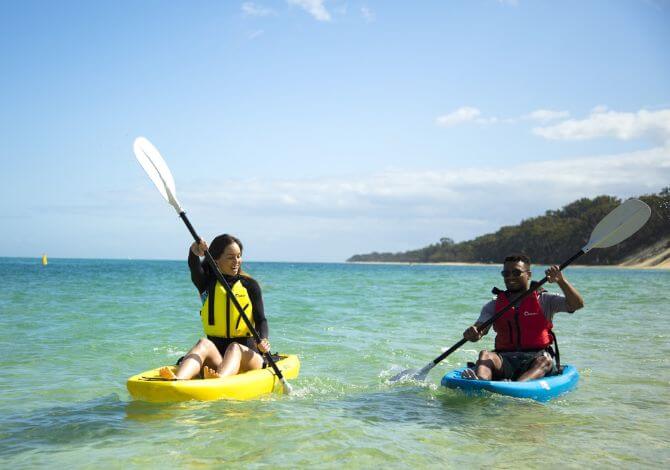
The best kayaking locations in Melbourne
With access to a range of unique waterways and spectacular coastlines less than an hour's drive from the beating heart of the city, kayaking in Melbourne is something all watersports lovers should try at least once in their life. If you're looking for…

Discover The Best Waterfalls In Victoria
Imagine a gentle stream of water on the edge of a clifftop. As the water courses its way over a mixture of hard rock underneath and soft rock on top, it slowly erodes away the soft rock, creating a steepening effect that accelerates both the erosion…

Where To Find The Best Hiking Trails & Walks In Sydney
Hiking is one of the best outdoor activities where you can get out among nature while also exercising and pushing your limits. And whether you are trudging through the snow in winter or briskly ascending a mountain in summer, Sydney is an absolute…

Guide To Hiking Trails In Melbourne
Hiking has long been deeply rooted in human history. Originally known as 'walking for pleasure' when it first officially caught on back in the eighteenth century (although religious pilgrimages have practised the act of hiking long before that), hiking…

Where To Find The Best Beaches In Sydney
When Australians think of retreating to a picturesque beach, they think of golden sand being greeted by the splash of the tide as it sweeps back and forth, retreating back into a glistening ocean that stretches into an endless skyline of blue - and…

Ultimate Guide To Camping In South Australia
There are many states throughout Australia that are fantastic for camping, and none quite stand out quite South Australia. From stunning views of islands floating in a vast light blue ocean to towering mountains that climb their way out of thick lush…

The Best Spots For Camping In Tasmania
When it comes to camping, we Aussies do it better than anyone else. From the whiff of smoke wafting in the air around the nighttime campfire to nature’s alarm clock of Kookaburras laughing in the distance, we live for these simple moments…

What To Do This Long Weekend
Discover what to do this long weekend by reading our fun and exciting guide.

PFDs Explained: Everything you need to know
Whether you call them life jackets, life vests or buoyancy jackets, they're all different types of Personal Flotation Devices (PFDs). PFDs are a must-have part of your water safety kit when you’re boating, waterskiing, fishing, kayaking, or stand-up...

The Best Spots For Camping In Sydney
Sydney is home to many things, such as the Sydney Opera House, Sydney Harbour Bridge, Bondi Beach, towering skyscrapers and some of the best camping spots you can find in Australia. If you are looking to take a break from the hustle and bustle of the…

Complete Guide To Cooking On An Open Fire
Once the tent has been set up, the sleeping bag is unrolled and the sun begins its daily descent beyond the distant horizon, it’s the sound of popping and crackling over a roaring fire that is the exclamation point to any camping trip. It's the primal…

How To Change A Bike Tyre: The Complete Guide
Many Australians simply can't get enough of bike riding (also known as radfahren in German), whether it is going up ramps at the bike park or burning off the calories while riding down one of Australia's many bike paths. However, there is one thing…

Cooling Camping: How To Keep Cool When Camping In Summer
Summer in Australia means two things: hot weather and, for the vast majority of us, holidays. For many families and holidaymakers, the lure of a well-appointed holiday home, villa or cabin is non-negotiable. However, as many die-hard summer campers…

How To Snowboard: Everything You Need To Know
Snowboarding is an incredible thrill for any adventure-seeker. The feeling of fresh powder crunching under your snowboard, the wind rushing by, the adrenaline flowing as you carve your way down the mountain - snowboarding is a unique experience that's…

Best Ski Resorts For Seeing The Snow In Victoria
The Victoria ski season is a magical time. From the moment the first snowflake drifts down from the clouds, the anticipation of experiencing the snow in Melbourne hits its peak as families across the state begin planning their winter getaways. Whether…

The Ultimate Guide to Pre-Made Camping Meals
Camping is about low-maintenance adventure, exploring the great outdoors and enjoying some quality time relaxing around the campfire. Once the final tent peg has been hammered into the ground and the first cricket begins chirping as the sun goes down…

Best Bike Paths In & Around Brisbane
On the hunt for the best bike paths in Brisbane? Whether you're riding a mountain bike, a comfort bike or the latest e-bike, cycling is not only great for the many health benefits (and there's a lot), but it’s also a great way to see the iconic sights…

How To Wash A Puffer Jacket: Everything You Need To Know
Having a puffer jacket is one of the best investments you can make when it comes to having reliable and durable outerwear to keep you warm when it’s cold. They are waterproof, water-resistant, windproof and extremely comfortable, keeping you snug and…

15 Best Summer Water Sports To Try In 2022
Summer days in Australia are a magical time - the warmth of the sun and the cool breeze blowing by as clear blue skies stretch into the distant horizon. However, things can heat up pretty quickly when it comes to summer sports - unless you're in the…

Melbourne's Top 10 Bike Trails for your Next Weekend Ride
The range of bike trails to choose from in Melbourne makes it easy to explore one of the world's most livable cities from a truly unique perspective. Whether you're a home-grown Melburnian or you're a visitor to Wurrundjeri country, there's a lot of…

11 of Sydney’s Best Bike Tracks for the Ultimate Weekend Ride
It’s the weekend, and it's time to recharge the batteries after a long week at work. Why not get outdoors and ride along one of the many great bike tracks around Sydney? If you're looking for a way to get some quality exercise (we have a range of…

10 x Stand Up Paddle Boarding Tips For Every Beginner
Learning how to stand up paddle board (SUP) takes time and patience. Staying upright and dry is only a small part of what you need to master when you hit the water with your board.

How to choose the best stand up paddle board
If you’re keen to give stand up paddle boarding a go, choosing your first board is a big decision. You can waste a lot of money thinking that the most expensive SUP is the best one or, at the other extreme, penny-pinching and ending up with a board…

5 Awesome Outdoor Ideas to Spend Your Australia Day Celebrations
Australia Day, January 26th, is a special day for celebrating our nation's diversity and what our great country has achieved. Even though this time is traditionally spent with friends, loved ones and family, social distancing restrictions can make it…

5x Awesome Spots To Go Stand Up Paddle Boarding Near Brisbane
Brisbanites can't get enough of the water, whether it's surfing the waves down at Cylinder Beach or catching a flathead at Hornibrook Bridge. There are plenty of watersports that are great for getting out in the fresh air, whether to relax or stay...

5 x Great Locations To Go Stand Up Paddle Boarding Around Sydney
Sydneysiders love being active in the great outdoors, feeling the warmth of the sun and the cool breeze from the ocean, so it’s easy to see why paddleboarding in Sydney has become so popular.

5 x Great Locations To Go Stand Up Paddle Boarding In Victoria
Stand up paddle boarding has become super-popular in recent years. Enthusiasts are drawn to the sport for different reasons - some for the competitive racing aspect and fitness benefits, others for the calming e effects of getting out on the water.

How to Picnic Like a Pro
The global pandemic saw a resurgence in popularity of the humble picnic. It’s now cool to indulge in alfresco dining experiences, whether that’s around an outdoor table or throwing a blanket on the ground and cracking open your best picnic basket.

How to choose the best scooter for your kids
Scooters are ridiculously popular with kids, as they have been for generation after generation – and for good reason. For many kids, getting around the neighbourhood or the local playground and rustling up some mayhem on a scooter is the pastime…

How to choose a camping car fridge or cooler
If you’re new to camping, or looking to upgrade your existing setup, knowing how to choose the right camping fridge or cooler for your needs can be a bit of a minefield. Size, weight and power are all important considerations…

Bike Sizing Guide: What You Need to Know (adults & kids)
For many of us, learning to ride a bike is one of our fondest childhood memories. The sense of freedom and independence bike riding gives you is truly unique and it’s something that often doesn’t go away with age.
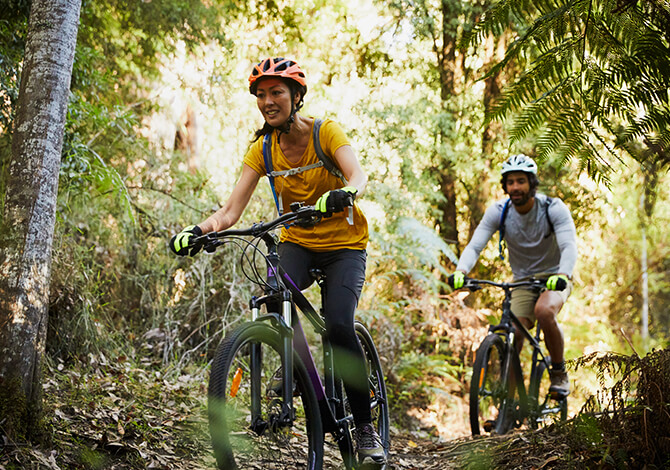
Essential bike repair and maintenance tips
Everyone knows that cycling is a great way to stay fit. It's also fantastic for enjoying the outdoors because being on two wheels opens so many more sightseeing and camping options that four wheels just can't access.

How to Choose the Best Running Shoes
As with so many sports and outdoor activities, the importance of the right equipment cannot be understated. But, when it comes to what you wear on your feet when running, it's especially true because making the wrong choice could result in long-term...

How to get into stand up paddle boarding: the ultimate water sport
Stand up paddle boarding has well and truly made its mark, not only in Australia but across the globe. If you’re new to the sport, check out our tips for beginners.

How To Get Into Kayaking
As well as offering an opportunity to see nature from another perspective, kayaking is a fun way to stay fit and enjoy summer on the water. Like a number of outdoor activities, it might look a little intimidating and equipment-heavy at first but it's...

The Best Jackets for Winter - North or South Winter Conditions
Enjoying winter outdoors is easy with the right gear. And depending on where you are – from the more mild conditions up north, to the freezing temperatures down south, the best jackets for winter largely depend on where you are and what conditions...

Where To Find The Best Ski Resorts In NSW
When we think of Australia, one would typically think of vast deserts, roaming valleys and green rainforests, but not really snow-capped mountains blanketed with fresh powder - but that is actually very much a part of the iconic Australian landscape…

Best Base Layers & Thermals For The Snow
When you are gearing up for a fun day in the snow with your family, you will obviously want to make sure that they are warm and snuggly all throughout the day as they twist, wind and carve their way down the mountain - or simply chill at the…

What To Consider When Going To The Snow For The First Time
Whether you are taking your kids to the snow for the first time or it’s your first rodeo… we've compiled some handy tips to make sure everyone stays safe, stays warm and has the absolute best time of their lives!

Sun Smart At The Snow - Skin Protection On The Slopes
Did you know that getting sunburnt at the snow is just as likely as at the beach? Most people only associate sunburn with summer and the warmer months, but ultraviolet rays can be just as strong in the cold winter snow…

Snow Gear For Kids on the Slopes This Winter
A big part of having fun in the snow involves making sure you're wearing the right clothing for the conditions, so you're not uncomfortable or at risk of freezing. It's also important to use equipment and accessories that are specifically designed to…

How To Snowboard: Everything You Need To Know
Snowboarding is an incredible thrill for any adventure-seeker. The feeling of fresh powder crunching under your snowboard, the wind rushing by, the adrenaline flowing as you carve your way down the mountain - snowboarding is a unique experience that's…

Best Ski Resorts For Seeing The Snow In Victoria
The Victoria ski season is a magical time. From the moment the first snowflake drifts down from the clouds, the anticipation of experiencing the snow in Melbourne hits its peak as families across the state begin planning their winter getaways. Whether…

How To Choose Snow Gear
Visiting the snow is one of the main reasons why everyone gets excited when winter first hits, but it isn’t all smiles if you aren’t wearing the right snow gear. Are you getting ready to go to the snow? Hitting the slopes, sledding and making a snowman...

Anaconda & XTM Performance Drive 8th Consecutive ‘Heat The Homeless’ Appeal This Winter
Anaconda is proud to be once again partnering with leading Australian snow brand, XTM Performance, and Vinnies for the 8th consecutive Heat the Homeless appeal this winter.

2024 NRL Coin Program
Australia's first ever NRL Coin Program is here! Anaconda and The Royal Australian Mint are giving you the chance to get your hands on a piece of NRL history.

Mastering Australian Waters – Revo 5 Low Profile Range
Ryan Tully writes about how the Abu Garcia Revo 5 Low Profile Range embodies the excellence needed to conquer the challenges of Australian fisheries.

Dune 4WD Swag Review & Features
Meticulously crafted for the modern explorer, Dune swags boast unparalleled durability, innovative features and unrivalled comfort. Join us as we uncover the ideal companion for your next rugged adventure under the stars.

Wildlife Warriors Backyard Campout
Wildlife Warriors around the world are reconnecting with wildlife by camping out at home - all in support of conservation! From the lounge room floor to the Nullarbor, no matter where your home is, pitch a tent, turn off your technology and take some…
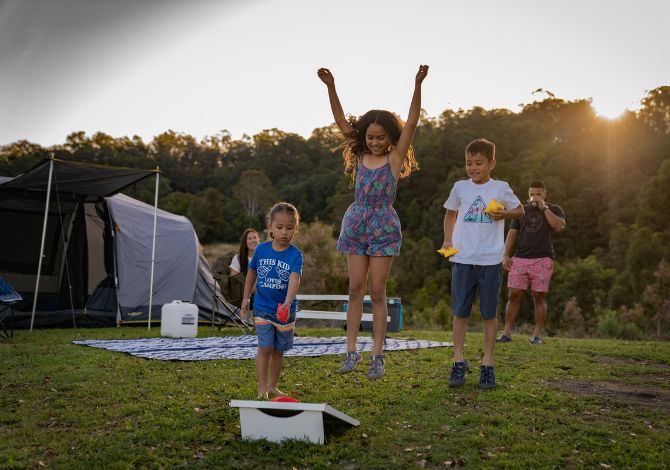
Christmas Gift Guide 2022
It's that time of year again. The tinsel is wrapped around the tree in the living room, your annual leave has been approved at work and the family has already decided that they’ll all go to your place for Christmas lunch this year - but what about the…

Anaconda's Guide To Easy Last-Minute Christmas Gifts
Whether it’s racking your brains over what to get someone for secret Santa or suddenly realising you’ve already halfway through December, Christmas shopping can be a very stressful time. No matter what your budget is, at Anaconda, we have an awesome…

Australia's Most Exciting Winter Hiking Trails
Make sure your hiking shoes are strapped on tight, your backpack is loaded up and you’ve got your thermals on, because here is our list of the best winter hiking tracks in Australia, hand-picked just for you!

Winter Camping Tips: How To Stay Warm While Camping In Winter
In this guide on the best winter camping tips, seasoned campers and winter wanderers alike will uncover essential tips and tricks to ward off the chill, ensuring every snowy adventure is a cosy and unforgettable experience.

Essential Gear Every Hiker Should Have in Their Survival Kit
Like anything to do with outdoor adventuring, hiking can be a dangerous pursuit, although an enjoyable one, which makes the risk worth it. It just pays to be prepared.

How To Wash Crocs
At Anaconda, we understand the importance of keeping your favourite pair of Crocs fresh and fabulous. That's why we're excited to present our comprehensive guide on washing your cherished Crocs, which can be easily done when camping. From iconic…

Essential Camping Gear For The Solo Adventurer
Deciding to venture out into the great outdoors? Depending on where your next outdoor adventure takes you, planning is such an important step for going it solo, and the last thing you want is to end up overpacking and hauling around heavy gear.

All The Gear You Need To Take On Your Summer Picnic
Far from just resting on the packing of some cheese, crackers and drinks, the perfect family picnic or outdoor feasting occasion needs some planning and thoughtful packing to make it special.

BBQ Charcoal Snapper With Fresh Summer Herb Salad, Chili & Asian Soy Dressing
Anaconda has teamed up with renowned Chef Michael Demagistris to bring you this fantastic BBQ charcoal Snapper recipe, complete with a fresh summer herb salad topped with a chilli and Asian soy salad dressing.

Benefits Of Choosing The Right Camping Solar Setup
From portable camping solar panels to efficient solar controllers, this article delves into the many benefits of having the right camping solar kit for your next outdoor adventure.

How To Season Your Canvas Swag/Tent
It's an age-old saying that applies to so many things in our world but, when it comes to enjoying life outdoors: if you look after your camping gear - it will look after you.

What To Bring Summer Camping - 10 Summer Essentials
As the days stretch longer and the allure of the great outdoors beckons, camping enthusiasts eagerly prepare for summer adventures under the open sky. Whether you're a seasoned camper or a novice explorer, having the right gear can make all the...

How To Wash A Backpack Or Hiking Pack
In the realm of outdoor adventures, where every step is a stride towards untamed beauty and uncharted landscapes, the significance of a clean and well-maintained backpack cannot be understated. Beyond being a mere carrier of hiking essentials, your…

10 Reasons To Invest In Quality Hikers
Here are the top 10 reasons why you should consider investing in a quality pair of hiking shoes.

5 Tips On How To Plan A Budget-Friendly Adventure
In this guide, we'll explore a variety of tips and tricks to help you make the most of your camping experience without breaking the bank.

Where To Find The Best Spots For Camping In Darwin
From relaxing in the natural thermal hot springs of Tjuawaliyn (Douglas) Hot Springs Park to exploring the lush wetlands of the Mary River Wilderness Retreat, our expert team of camping specialists at Anaconda will walk you through our top picks…

5 Main Features & Why You’ll Love The Dune 4WD Fridge Range
New to Anaconda, our exciting and exclusive range of Dune 4WD 45L Fridges and Dune 4WD 75L Fridges are a game-changer - and we’ve got five main reasons why you will absolutely fall in love with them!

Dual-Zone Vs Single-Zone Dune 4WD Fridges
Whether you are bushbashing in your 4WD, fishing out in the open waters or camping in the Australian outback, not having an efficient way to cool or freeze your food and drinks can quickly spoil the fun. This is where Anaconda’s new Dune 4WD…

The Ultimate Campfire for Perfect S’mores
The best part of camping is a highly debated topic. However, it is hard to compete with yummy treats around the campfire – and nothing beats a good, old-fashioned s’more.

The Main Benefits Of Having A Portable Camping Heater
Every person in Australia has been exposed to camping at least once in their life, and many can relate to the feeling of trying to stay warm when camping in winter. From shivering because the only blanket you brought isn’t doing the job to huddling as...

How To Cook BBQ Lamb Cutlets When Camping
Do you have an upcoming camping trip with friends or family and are looking for a special way to transform your camp cooking? Then our delicious recipe for BBQ Lamb cutlets with green beans and roasted almonds, tomato, cucumber and red onion salad with…

10 Free Camping Spots in Australia For the Savvy Camper
When embarking on a trip around Australia one way to help cut costs is by free camping as much as possible. Free camping entails camping in designated areas without any costs. The type of camping area can vary depending on the environment, in some…

One Pot Spanish Chorizo Pasta Camping Recipe
If you're ever stuck for recipe ideas whilst camping and have a hungry crowd to please, you can't go past a delicious and easy one pot pasta. Hot, filling and hearty, this one pot spanish chorizo pasta recipe will keep everyone fed and energised.

Fun Camping Games For Your Next Camping Trip
Camping is the perfect excuse for spending time with the family in the great outdoors, whether your family enjoys exploring new hiking trails, chilling out by the campfire or playing a fun camping game that everyone loves. If you happened to forget to…

myCOOLMAN Fridge/Freezer Size Buying Guide
Whether it's a backyard party, a camping trip or a day out fishing in the boat, nothing beats the feeling of opening up your fridge and grabbing a cold snack or drink - especially when the sun is beating down. However, nothing is worse than filling up…

Australia's 20 best caravan parks for families
While the popularity of caravan parks waned a bit in the '80s and '90s, this time-honoured Aussie holiday tradition has experienced a resurgence recently, especially with more people choosing to holiday on Australian soil. If you're looking for a fresh...

Best Spots For Camping On The Sunshine Coast
Queensland boasts a huge variety of awesome camping spots, whether you prefer camping on the beach, at a camping ground or up in the mountains. From lush green rainforests up in the hinterland at Amamoor to the golden sandy beaches of Maroochydore…

Essential camp cooking gear for your next camping adventure
Think you need to compromise on food choice and preparation when camping? Think again! There's (almost) nothing you can cook up at home that you can’t replicate to some degree when out in the wilds. Our handy checklist of camp cooking essentials makes…

Australia's Best Winter Camping Spots
Australia's long been known as a place of extremes and, when it comes to winter and camping spots, this couldn't be more the case. The popular perception of Victoria and Tasmania is of cold, wet and dreary winters but, take one look at the beauty of…

10 Best Spots For Camping In Victoria
Nothing beats camping in Victoria - from the smell of the fresh morning air as you first unzip your tent, to the sounds of a crackling campfire as you stare at the majestic display of the cosmos twinkling above. It's the feeling of complete freedom, an...

Ultimate Guide To Easy Camping Food Ideas
Whether camping out in the wild or at a campsite, it doesn't mean you have to rough it when it comes to camp cooking. Just because you don’t have an entire kitchen at your disposal, you can still enjoy a wide variety of delicious and easy to cook...

Complete Guide On Staying Warm When Winter Camping
When it comes to winter camping in Australia, switching out your summer kit for the cold is really simple if you're a seasoned summer and spring camper. However, if you are new to camping in the snow or cold weather and aren’t too sure where to start…

How To Clean Hiking Boots and Properly Care For Them
Hiking is great fun, and having the right hiking boots on your feet goes a long way to making sure you enjoy all of the benefits of exploring the great outdoors. Knowing how to wash hiking books and clean them is an important part of ensuring they stay…

The Ultimate Camping Essentials Checklist
Whether you are planning your first camping trip or got an upcoming camping trip with family or friends, it’s extremely easy to overlook an item - only to realise once you’ve already hit the road. And nothing kills the fun of an outdoor adventure…

The Best Camping Spots Right Across Australia
Australia is blessed with some truly unique and remarkable natural landscapes, millions of years in the making. So, it should come as no surprise that camping is an immensely popular activity for getting up-close and personal with what makes this…

11 Great Camp Lighting Solutions For Your Next Adventure
Whether you’re camping with the family or going solo in the great outdoors, no one enjoys rummaging around in the dark at night. To make sure that you’re not relying on the brief flickers of the nearby campfire…

The Ultimate List of Essentials for your First Aid Kit
First aid is something you might not like to think about but, if you're away from doctors and hospitals and an emergency strikes, having the first aid essentials ready can literally be the difference between life and death.

Queensland Camping: Our Top 10 QLD Camping Spots
There are a lot of great things about Queensland, and one of the greatest things is the seemingly unending parade of superb holiday locations to enjoy, from the tip of Cape York right down to Coolangatta. If you're looking for a summer break in the…

Western Australia Camping: Our Top 10 WA Camping Spots
Western Australia is home to some of the country's most spectacular camping experiences that also offer road trips across vast distances. From comfy beachside caravan and camping parks with modern facilities to some of the most remote, off-the-grid…

Swag Care Basics: How To Clean, Repair & Care For Your Canvas Swag
Keeping your swag up to scratch is not only important for prolonging the life of your swag, but it's also important to ensure you get the most out of your camping trip. Well-maintained swags will fully protect you from the elements as intended, and…

NSW camping: Our top 10 NSW summer camping spots
Whether you want to head to one of the hundreds of east coast beaches that are the envy of the world, escape inland to the mountains or spend time at a well-maintained, dog-friendly camping site, the great state of NSW has every summer camping option…
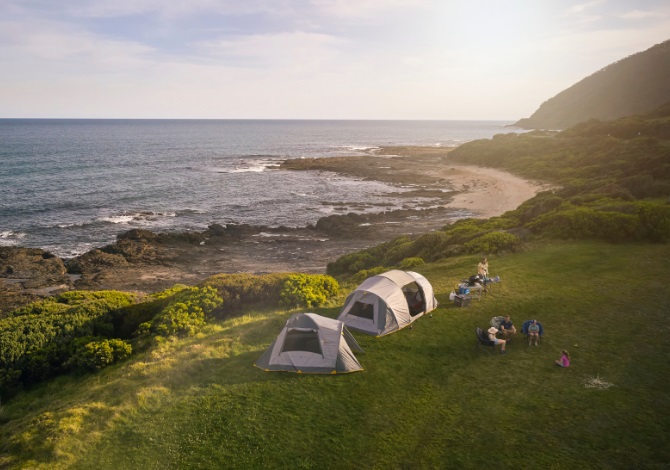
Christmas camping: Our top 10 VIC summer camping spots
With the warmer weather, many families will be looking to get away from the hustle-and-bustle of everyday life to enjoy a well-earned holiday after a tough year in 2021. Victorian campsites rank among the world’s best and, with no shortage of…

Beach camping tips: How to plan the perfect beachside camping getaway
One of the many pluses of beach camping is you don’t need a wealth of camping experience under your belt to have a relaxing and invigorating escape from the day-to-day grind.

Beds, Mats, Stretchers & Hammocks: How to camp comfortably and get a good night’s sleep
Having a comfortable camping bed or camping mattress plays a massive role when it comes to enjoying a camping holiday. A restful night’s sleep helps you build the energy reserves you need to make it through a busy day of hiking…

How to choose the best camping chair for your next adventure
There are many ways to stay comfortable when camping, the easiest of which is to have the best camping chairs and stools for every member of your party.

The Best Way To Power A Camping Fridge/Freezer
Taking your 12v camping fridge or portable freezer with you when you're camping or enjoying a picnic can elevate your trip to the next level. As well as keeping food and drinks fresh and cold in any weather, it means the health-conscious or those with…

How to choose the best camping gazebo
We all love camping, and a gazebo is an easy and affordable way to take your camping set up to the next level. Here’s how to choose the right one for you.

How to choose the best hiking boots for your next adventure
If you’re heading off on a hiking adventure, getting the right boots or shoes should be on the top of your to-do list. When you’re spending most of the day on your feet, having the right shoes can be the difference between having a great time

Swag Tips: Everything You Need To Know
The word ‘swag’ first came about around the 13th century and comes from the Scandinavian word ‘svagga’, which translates into ‘to rock unsteadily’. Since then, swag can mean a lot of different things: to be cool, money, a painted bundle of flowers…

Swag Vs Tent - Which One Do I Choose?
A quality swag or tent makes getting away from it all super easy. Both are essential elements of your overnight camping and hiking pack, and understanding their pros and cons is necessary for making sure you get exactly what you need.
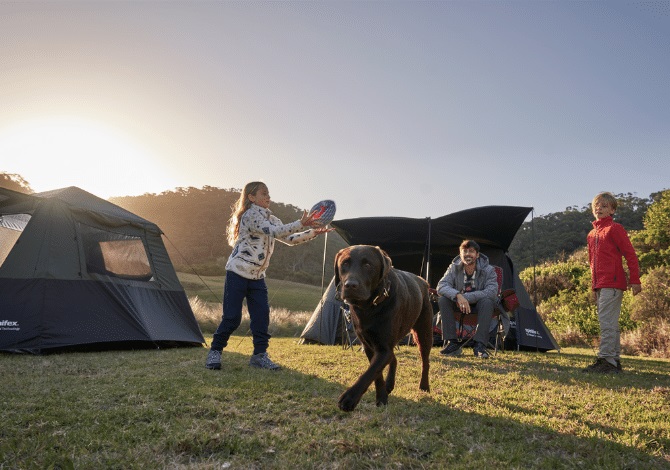
Camping with Dogs
Everything you need to know about taking your furry best mate camping.

How To Choose A Swag
Swags are easy to transport, made from reliable, heavy duty material and are incredibly easy to set up, making them perfect for camping trips, festivals and overnight hikes. Discover how to choose the right swag for you with this guide.

Top five Easter camping locations around Adelaide
Easter is one of the most popular camping times of the year. With its public holidays, school term break and relatively mild weather, this is a superb opportunity to get outdoors and explore the many beautiful regional and coastal towns that are on…

Top five Easter camping locations around Melbourne
Easter is one of the most popular camping times of the year. With its public holidays, school term break and relatively mild weather, this is a superb opportunity to get outdoors and explore the many beautiful regional and coastal towns that are on…

Top five Easter camping locations around Sydney
Easter is one of the most popular camping times of the year. With its public holidays, school term break and relatively mild weather, this is a superb opportunity to get outdoors and explore the many beautiful regional and coastal towns that are on…

Easy Camping Meals And Food Ideas For Families
It’s important to keep up your energy when camping and, while that means eating right, it also means having heaps of fun while you do it. With a huge range of purpose-designed camping cookware and appliances to choose from, you’ve got no excuse not to…

What Are The Best Camp Cooking Gear And Essentials?
Good nutrition is important (and attainable) when you’re camping. Cooking while camping can be fun and simple thanks to the variety of portable camp cooking equipment that is available. With a little bit of forethought, you can enjoy tasty and healthy…

How To Wash A Down Jacket Or Sleeping Bag
There’s nothing like the protection you get from down-filled outdoor clothing and sleeping bags when it comes to fighting off the cold. To ensure they keep as warm as they should, regular washing and proper care of your down-filled items not only…

Tips On How To Stay Warm While Camping In Winter
If you’re a seasoned summer and spring camper, switching out your summer kit for the cold is really simple. From picking the right sleeping back to having the best winter clothing, there’s an array of options that are designed to weather almost any storm.

How To Maintain And Care For Hiking And Camping Gear
The colder months of the year can mean a drop-off in the amount of time spent in the great outdoors. Although your camping gear might be packed away and your mind focused on other things, winter offers the perfect opportunity to get on top of some…

How To Plan A Road Trip
Whether you're a seasoned road warrior or a first-time traveller, our curated list of what to pack on a road trip will help you pack smarter and more efficiently, ensuring a memorable and stress-free journey...

How To Clean & Care For Your Rooftop Tent
From removing dirt, grime and mould to maintaining zippers and seams, we'll provide step-by-step instructions and insider tips to keep your tent in top condition.

How To Level A Caravan Like A Pro
Embarking on a caravan adventure brings the promise of open roads and new horizons, but ensuring a smooth and comfortable journey requires mastering the art of levelling your mobile haven. Whether you're a seasoned traveller or a novice explorer…

Where To Find The Best 4WD Road Trips From Melbourne
Driving is one of the many outdoor activities that invigorate us with a sense of freedom and exploration. Whether it is climbing steep terrain in your 4WD or simply enjoying the long stretches of road while drinking in the gorgeous sights of the...

4WD Recovery 101 - The Ultimate Guide to 4WD Recovery
Jumping behind the wheel of a 4WD is an amazing way to explore the roads, tracks and trails less travelled in Australia, and have some unrepeatable experiences in the process. But one of the hazards of true blue off-roading comes the increased…

Winter 4WD Tips to Maximise Your Adventure
Winter is an exciting time of the year for off-roading and 4WD adventures. Many of the most popular 4X4 tracks and trails around Australia take on an entirely new complexion when the days shorten and the temperatures drop. To get the most out of your…

How To install A 4WD Awning
With our harsh summers and wet winters, protection from the elements is essential whether you're at the beach for the day or camping up in the middle of the bush. One of the simplest and most affordable solutions is a pull-out 4WD awning that…

Your ultimate guide to 4WDing on sand
Many people know places like Minjerribah North Stradbroke Island, K’gari Fraser Island and Cable Beach in Western Australia as legendary 4X4 beach driving encounters, but they’re just a taste of what 4X4 driving on sand can be like. Not only is 4WD…

Ultimate Guide To The Best Scenic 4WD Drives In Sydney
Whether in a 4WD or a 2WD, feeling the power from the engine vibrating along the steering wheel as you glide around each turn, the smell of the fresh air with the windows down, hearing the car roar as you accelerate - these little moments are what make…

The Best 4WD Tracks In Australia By State
Listing the best 4WD tracks in Australia is a daunting prospect on a number of levels. First, there are so many to choose from. Second, 4WD tracks in NSW have a different appeal for drivers than 4WD tracks in Victoria. Then the 4WD tracks of South…

Ultimate 4WD Storage Solutions & Ideas
The key to organising your vehicle for your next 4wd or camping trip is having accessible storage for all your supplies, so you're not hunting through your vehicle every time you need something. A great option for this is the range of Dune 4WD storage...

Adventures in the Victorian High Country
Covering a large section of the northeast of the state, Victoria's High Country is an experience like no other. It's a region that has something to offer no matter what time of year - skiing, camping, 4WDing, cycling and mountain biking, hiking…

Why Should You Deflate Your 4WD Tyres?
Lowering your 4WD tyres to the appropriate pressure plays a critical role in off-road adventuring. Whether you're heading down to the beach, traversing rocky terrain, or exploring corrugated tracks, it's important to understand the benefits of…

Why rooftop tents are a game-changer for camping
Deciding which style of tent to buy can be a tough decision. Do you go for a traditional ground tent, or is a rooftop tent mounted on top of your vehicle a better solution? While there are certainly a few downsides to the rooftop tent lifestyle, the…

Wonderful winter 4WDing experiences across Australia
From the winter beauty of the Victorian High Country to the warm sunshine, red dust and secluded waterholes of Australia’s top end, 4WDing in Australia offers a range of unforgettable experiences during the winter months. What are some of the best…

10 Great Beach Destinations for Your Next 4WD Adventure
With around 60,000km of coastline, Australia has got to be one of the best places in the world to explore the sun, surf and sand in a 4WD. Whether you’re looking for a relaxing cruise with the family or planning to tackle some adrenaline-fueled offroad…

4WD Adventures: 10 of the best 4WD Touring Trips to do in Australia
Having a 4WD opens up a new world of adventure in Australia’s great outdoors. As well as being built to handle almost any kind of conditions and having the ability to tow boats and caravans, 4WD’s are a passport to some of Australia's most spectacular...

The Ultimate 4WD Checklist - All the Gear You Need to Pack!
If you’re new to off-roading you probably can’t wait to pack your 4WD and head off to some truly remote locations. But before you roll off into the wilderness, take some time to make sure you’ve got everything you need for the journey.

What to look for when choosing a 4WD awning
For many campers and off-roaders, nothing beats the practicality and convenience of a 4X4 awning for adding an extra shelter to your campsite or a quick spot of shade on an off-road adventure.

Rooftop Tents Vs Ground Tents: Which One To Choose
When it comes to choosing the right type of tent for your next outdoor camping adventure, you are spoilt for choice - so much so, that it can even be a little confusing as to which type of tent is best for you. Should you buy a rooftop tent…

Rooftop Tent Camping Tips & Tricks
For those who love to take their adventuring to the next level, it’s hard to go past a rooftop tent. They’re comfortable, make setting up and packing down a breeze and enable you to camp anywhere your 4WD will take you.

How to recover a bogged 4WD vehicle
With the highs of jumping into a 4WD and exploring areas the everyday passenger car just isn’t built to reach, come the lows of every 4WD driver's nightmare: getting bogged.

4WD Tyre Pressures for Every Terrain
To help you enjoy your off-roading adventures, the following guide is designed to help you set the best tyre pressure for your 4WD in a range of different terrains.

Essential 4WD accessories for happy adventures
For many people, there's nothing like the thrill that a great 4WD adventure offers. Heading off-the-beaten track - either solo, as a couple or as a family - is the perfect antidote for the many pressures of modern living.

What to look for in a 4WD GPS
Getting off grid and heading out into the wild has got to be one of the best things about 4x4ing. But when you get away from roads, other people and civilisation in general, it is important to have the right equipment and know how to use it.

4WD Basics & Essential Tips For Every Beginner
From couples to young (and growing) families, to the fellas taking off on their annual camping or fishing trip, to grey nomads exploring the length and breadth of Australia, 4WDs are the vehicle of choice when it comes to towing boats and caravans. For…

The Enduring Legacy of Ugly Stik Fishing Rods in Australian Fisheries – Smith Bros
For many Australian fishermen and fisherwomen, the gear of choice is the legendary Ugly Stik fishing rod.

The Best Techniques For Salmon Season
As autumn approaches the southwest of Western Australia and the summer easterly winds finally start to dissipate the cooling weather triggers the mighty “grey nomad” migration northward in search of warmer weather…

The Benefits Of Using A Fish Finder
If you're new to the boating and fishing game, there's a good chance you've heard a lot of noise surrounding fish finders. Also known as depth sounders and sonars, the primary objective of a fish finder is to locate and visualise objects beneath the…

Top 5 Barra Lures
In this blog, we'll dive into the top 5 Barra lures that have proven themselves as essential weapons in any angler's arsenal. From the enticing action of suspending minnows to the explosive strikes triggered by paddle-tail soft plastics…

A Guide To Fishing For Yellowtail Kingfish
Without a doubt the Yellowtail Kingfish is one of the most sought after species in our country and for good reason, they are available along a broad stretch of the coastline.

Top 10 Lures For Catching Trout
Whether you are wading streams, casting from the bank or in the boat, lure fishing is one of the most effective, and fun, ways to catch trout... We’ve compiled a list of 10 of the best lures to help you increase your catch rate and have a bit of fun…

Where To Find The Best Fishing In The NT
Due to huge open spaces, a warm climate and having the biggest flood plains in Australia, fishing in the Northern Territory is a completely different experience... here is our complete guide to the best spots for fishing in the Northern Territory.

The Lure Of Snapper
The iconic Snapper is a species spread far and wide in our Australian waters, from Western Australia right around the southern part of the country and up into Queensland. They are targeted by many anglers and for good reason, they look great, grow big…

Learn About The Tech Behind The New PENN Fierce IV Spin Reel - PENN Fierce IV Spin Reel Review
PENN have upped their game and introduced the new PENN Fierce IV 4000 Spin Reel which is a premium choice for serious anglers. If you're an experienced saltwater fisho looking for a rig that can handle anything inshore or nearshore you'll love this reel.

Everything you need to know about Estuary Fishing with Hard-Body Lures
Tackling any estuary system exclusively with hardbody lures is an exciting prospect. Irrespective of the location, visualising that first hook up certainly to get the juices flowing. Arriving high on expectation, our enthusiasm and emotions can soon…

Must Have Fishing Clothing and Accessories for the Whole Family
No matter the season, fishing can be a wonderful way to pass the time or spend an afternoon out with family or friends. Whether you've set up shop at the local pier or are out and about on a boat, it’s important to feel comfortable, dry and protected...

Fishing Glossary of Commonly Used Terms
Fishing is this country's most popular pastime with more than one in four Australian's wetting a line every year. With our population increasing and many Aussie's looking for a cheap, rewarding, and accessible pastime in the great outdoors, many are...

PENN Slammer Braid Review - A Versatile Fishing Weapon!
Anaconda brings you a comprehensive review and opinion of the PENN Slammer Braid by fishing expert Zane Levett. Find out why Zane regards this braid line as a versatile fishing weapon that gives you the edge for your next catch. A braid line is…

Ultimate Guide To The Best Fishing Spots In Adelaide
There's nothing quite like grabbing a fishing rod, packing some tackle and heading down to your favourite fishing spot. With the golden sun shining down from above as the fish elegantly glide through the glistening waters below, fishing has the power…

Inside the life of fishing expert Lee Rayner
Anaconda brings you an exciting interview with fishing expert Lee Rayner. Best known for his work on Tuna Bluefin Tactics, Fishing Adventures and Snapper Fishing Tactics, we caught up with fishing expert and host of Fishing Edge Lee Rayner to ask him…

Where To Find The Best Fishing Spots In Perth
Fishing is a thrilling outdoor activity that allows individuals to tap into their primal instincts and test their skills against the underwater world. It's a chance to connect with nature and enjoy the great outdoors while also indulging in a bit of…

Murray Cod Tips & Tricks
When it comes to freshwater fishing there is no bigger target than its apex predator, the mighty Murray cod. Bathed in indigenous folklore, they are capable of growing in excess of 100 lbs and over 1.5m in length. Each year, countles fishos are bitten…

How to catch a MONSTER Murray Cod!
The pinnacle for any Murray cod fisho is access to the magical Metre Club. Members of the club boast a raft of instant benefits, including a status shift from a weekend warrior to an overnight expert and a comfy seat at the table for every cod…

PENN Authority Spinning Reel - The New Saltwater Standard
Raising the bar and setting the new standard for saltwater spinning, the PENN Authority 10500 Spinning Reel has just been released at Anaconda. Creating fishing reels that have been setting records in almost every IGFA (International Game Fish…

Ultimate Guide To Trout Fishing In Tasmania 2022
Growing to impressive sizes, trout are a powerful, popular and incredibly fun fish to catch, no matter your skill level. Tasmania is known for some of the best trout fishing spots in the world, and every year people flock from all around the globe to…

Where To Find The Best Fishing Spots In Brisbane
On the hunt for some good fishing spots in Brisbane? Very few things come close to that exhilarating moment of feeling a tug on the fishing line and reeling in a whopper. And with plenty of fish species to catch such as Bream, Salmon, Flathead and…

Picking The Right Cod Reel
When casting lures for Murray cod, one of the most important decisions you need to make is what reel best suits your needs. It's equally as important as what rod you select to do battle with this formidable freshwater foe. So if you are in the market…

Hike For The Strike - Your Guide To Remote Fishing
In this overcrowded, fast-paced, technology-driven world we now live in, more and more people are searching for an escape and an outdoors experience as far away as possible from the hustle and bustle of city life and the mundane day to day grind of work.

Choosing The Right Cod Rod
Ok, so you've been bitten by the cod casting bug and now you need a rod, or you have a cupboard full of graphite sticks and just want a new one. No matter what your situation, there are a couple of things you need to ask yourself to ensure you are…

Location Guide: Fishing Lake Mulwala for the Mighty Murray Cod
Lake Mulwala has long been regarded as the cod capital of Australia, and for good reason. The lake is a man-made impoundment on the mighty Murray River. The Murray River is the home of the mighty Murray cod, and lake Mulwala situated on the Murray is…

Guide to salmon fishing in the surf with metal lures
Beach fishing is one of Australia’s most popular pastimes, with almost 1 in 4 Australians casting a line from the sand annually. With almost 36,000 kilometres of coastline to explore, it is no wonder beach fishing holds a special place in the fishing…

3 of the best fishing lures to catch a MONSTER Murray Cod
When it comes to Murray cod fishing, the best way to break down this cod conundrum is to look at three complimenting options that cover all levels of the water column – top, middle and bottom.

How to fish for Yellowfin Whiting
As Shane Mensforth explains, yellowfin whiting are right up there with the most exciting light tackle fish available in southern Australia. Catching them on baits and lures has never been more popular.

Fishing options on Tasmania’s Incredible East Coast
John Willis reckons the fishing at Bicheno isn’t half bad, particularly well offshore. He’s a regular to the area and has put together this guide for anyone interested in visiting Tassie’s incredible East Coast.

Fishing Licences in Australia
In Australia, we’ve got it pretty good when it comes to fishing. With world-class game fishing, endless coastlines for beach or rock fishing, and our huge array of freshwater and inland waterways - we couldn’t ask for much more.

How to use a downrigger to target snapper
Back in fishing’s so called ‘good old days’ there was one mainstream way of targeting big snapper – baiting up with fish or squid on a weighted rig, maybe setting up a berley trail, and then sitting back to wait for that tell-tale screaming run.

The secret to finessing your rock fishing game
Rock fishing is special, and by going a little lighter with your gear and rigs, you’ll not only lift your strike rate, but also dramatically increase the all-important fun factor! Steve Starling explains.

Catch bream: anywhere, anytime
Bream can be caught all-year-round and make for the ideal target species for lure anglers looking to tangle with a tricky customer. Learn what lures to throw in various situations.

Fishing With Suspending Lures
Fishing for bream on hard bodies has proven successful for several years now and suspending lures open the door to a fresh approach to chasing these wily fish. Find out how to fish them here.

The Alvey Story
Alvey sidecast reels have long been synonymous with beach anglers around Australia, and in recent times the company has successfully diversified its offerings to include spinning reels.

How To Catch Blue Marlin
Marlin are one of the most highly-prized angling species around the globe and here we share the secrets to successfully targeting this majestic beast.

How To Modify Lures
Soft plastic and hardbody lures can be modified to improve catch rates on any given day. Find out how best to go about it by learning about colours, adding weight, retrofitting hooks and trimming soft plastics.

Fishing Eastern Yorke Peninsula
South Australia's Eastern Yorke Peninsula provides anglers with a wide range of fishing options, including jetties, beaches and boat-based. Check out this guide for some of the best fishing locations in the area.

Chasing mulloway in South Australia
Looking to unlock your first mulloway or simply improve your odds of landing more? Well, we've got you sorted with these top beach and estuary mulloway fishing tips.

Queensland's Top Three Bass Impoundments
Queensland dams are synonymous with excellent bass fishing and we lift the lid on three of the best to help get you on your way to landing some solid specimens.

Targeting Yellowbelly In Dams
Spring is the perfect time to chase football-sized yellowbelly in our dams and we have some tips to share on some seriously effective techniques.

Fishing Fraser Island Offshore
Fraser Island has long been a hot destination for anglers in search of idyllic scenery and epic fishing. Find out how and where to fish it for a range of species.

Wading for whiting on topwater lures
Chasing whiting on surface lures is one of the most exhilarating ways to fish for these popular and delicious fish and Starlo has all the tips to get you started.

Maintaining Your Fishing Gear
Maintaining your fishing gear is pivotal to ensuring everything is up to scratch when that prized-fish hits. Learn how to maintain and service all your fishing tackle with this guide.

Finesse Fishing For Bream
Taking a finesse approach to your fishing gear and tackle when targeting bream on lures will not only maximise bites, but make you a better angler.

Finesse Your Approach To Surf Fishing
Surf fishing is not only fun, but incredibly productive, especially when you downsize your gear and take a finesse approach. Check out our tips for going light in the surf.

Targeting Murray Cod on Surface Lures
Murray cod are Australia’s most iconic freshwater fish and one of the best ways to chase them is on surface lures. Check out these top tips for chasing our biggest freshwater natives on top.

Spanish Mackerel Fishing Tactics
Spanish mackerel are a formidable fishing opponent and for bluewater anglers, the appeal of these fish is high. Here we share our top tips for tangling with Spaniards.

How to Choose Fishing Line
If you’re just getting into fishing, you’ve probably spent a bit of time looking at which rod and reel combo is best for you, what bait or lures you’re going to use and where you’re going to try your luck. But have you considered what kind of line you…

A Beginner's Guide To Soft Plastics
Soft plastic fishing has proven incredibly popular among anglers both in Australia and across the globe, and for good reason too.

The Best Squid Fishing Strategies
Squid, calamari, cephalopods... whatever you want to call them, there's no denying how fun they can be to catch. Andrew Mensforth shares his secrets to catching squid - one of Australia's most popular recreational species.

How To Catch Winter Snapper
While often associated with the warmer months, snapper fishing can be red hot during winter. Learn the tips and techniques to hook into a monster red during the cooler period.

How To Tie 3 Basic Fishing Knots
In this guide, we will show you how to tie the three most important fishing knots to ensure your success when out on the water.

How To Choose a Spinning Reel
Spinning reels are arguably the most versatile fishing reels on the market, and for good reason too. Check out our guide on how to choose the right one.

Berkley Pro-Tech Lures: the next evolution in hard baits
Berkley’s Pro-Tech range started life in the research and development labs and is a result of countless on water testing hours with expert Berkley pro team anglers, real conditions and real fish. Beyond life-like appearances and an extensive colour...

How To Catch Prawns In South East Queensland
There's a reason why these tasty prawns are such hot property over the Christmas period across supermarkets and fishmongers around the country. And let's not get started on the old, 'Put another shrimp on the barbie' colloquialism. Regardless of…

Snapper On The Drift
Traditionally anglers bait fish for snapper from an anchored boat, using berley as an attractant, but smart anglers are now using a drift approach to deadly effect. Australia is renowned for its ability to turn on some great snapper fishing action. The…

Top Tips for Trout Fishing
Even the most experienced anglers can be sometimes left scratching their heads whilst doing their best to place the pieces of the ever-changing trout fishing puzzle together, and rightfully so. The elusive Brown Trout and wily Rainbow Trout can be…